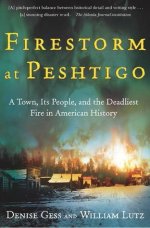Patrick Murtha
Reader
I like non-fiction disaster / calamity books. Although they do share a common pattern, they always seem to absorb me completely. I tend to approach and read everything as a species of novel, and of course with disaster books, that is particularly easy.
For example, Denise Gess’s and William Luz’s Firestorm at Peshtigo. The Peshtigo fire in Northeast Wisconsin occurred simultaneously with the Great Chicago Fire and stemmed from the same weather conditions, but was far more deadly.
When I was a commercial real estate broker in Northeast Wisconsin, Peshtigo was part of my territory, so I know this turf well.

For example, Denise Gess’s and William Luz’s Firestorm at Peshtigo. The Peshtigo fire in Northeast Wisconsin occurred simultaneously with the Great Chicago Fire and stemmed from the same weather conditions, but was far more deadly.
When I was a commercial real estate broker in Northeast Wisconsin, Peshtigo was part of my territory, so I know this turf well.


